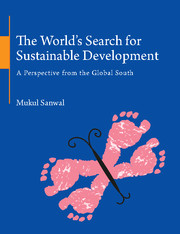Book contents
- Frontmatter
- Dedication
- Contents
- Preface
- Acknowledgments
- Abbreviations
- INTRODUCTION
- 1 Social Dimension of Sustainability
- CONSUMPTION IN AN UNEQUAL WORLD: FRAMING INTERNATIONAL COOPERATION
- CLIMATE POLICY: GLOBAL TO NATIONAL
- SUSTAINABLE DEVELOPMENT: NATIONAL TO GLOBAL
- CONSUMPTION IN A MORE EQUAL WORLD: SHAPING SOCIETAL FUNCTIONS
- 17 Geoeconomics of Human Well-being
- 18 Social Science – Policy – Society Interface
- 19 Reframing the ‘Common Concern’ From a Physical to a Social Problem
- 20 Developing a Shared Global Vision
- GEOPOLITICS TO GEOECONOMICS: RURAL–URBAN DIVIDE, RATHER THAN BETWEEN COUNTRIES
- THE ASIAN CENTURY
- Index
19 - Reframing the ‘Common Concern’ From a Physical to a Social Problem
from CONSUMPTION IN A MORE EQUAL WORLD: SHAPING SOCIETAL FUNCTIONS
Published online by Cambridge University Press: 18 December 2015
- Frontmatter
- Dedication
- Contents
- Preface
- Acknowledgments
- Abbreviations
- INTRODUCTION
- 1 Social Dimension of Sustainability
- CONSUMPTION IN AN UNEQUAL WORLD: FRAMING INTERNATIONAL COOPERATION
- CLIMATE POLICY: GLOBAL TO NATIONAL
- SUSTAINABLE DEVELOPMENT: NATIONAL TO GLOBAL
- CONSUMPTION IN A MORE EQUAL WORLD: SHAPING SOCIETAL FUNCTIONS
- 17 Geoeconomics of Human Well-being
- 18 Social Science – Policy – Society Interface
- 19 Reframing the ‘Common Concern’ From a Physical to a Social Problem
- 20 Developing a Shared Global Vision
- GEOPOLITICS TO GEOECONOMICS: RURAL–URBAN DIVIDE, RATHER THAN BETWEEN COUNTRIES
- THE ASIAN CENTURY
- Index
Summary
Measuring sustainability and human well-being
The context in which sustainability has been discussed at the multilateral level has changed since the issue first came onto the global agenda in 1972. Globalization, urbanization, increasing consumption patterns and continuing poverty despite the sustained economic growth of industrialized countries and some emerging countries have broadened perspectives. However, the response at the multilateral level to the transformative impact of the re-emergence of China has largely been of a scarcity mentality, seen as a zero-sum game, rather than develop a shared vision where everyone can become better off. The challenge everywhere is not limited to increase resource productivity – using fuel, water and raw materials more productively, as some have argued [The Economist, 2008], but also conserving and sharing resources by modifying patterns of global natural resource use.
Limits to growth concerns not just ecosystem scarcity but also the impact on individual welfare, through reduced freedom, or options. These are not unbearable restrictions and costs, for example, in the context of climate change. Since these are societal issues, ultimately it is society that has to change, and, therefore, different indicators are needed to complement the GDP indicator in order to generate a more balanced understanding of sustainable development. The 1970s study on ‘The Limits to Growth’ [Meadows et al., 1972], produced by the Club of Rome, had also discussed how to measure human welfare and changes to the natural environment. There is a broad agreement that the indicator GDP, or GDP per capita, is suitable for reflecting economic activity, but not social progress, national welfare and sustainable development. These discussions have been based in part on the parallel debates on quality of life and social indicators as inputs to state-related planning and international cooperation.
The choice of indicators and assumptions made to complement GDP and determine future ‘qualitative’ growth, is a political issue, and will be based on a clear understanding of what sustainability means. GDP, or GDP per capita, measures only market activities and monetary value. It does not provide information on income distribution, welfare or well-being. In making these choices, it is now being realized that exclusive focus on environmental damage should shift to enhancing standards of living, and its implications for use of natural resources. This would lead to considering the socio-economic as well as environmental trends in different countries, and the interaction within and between them.
- Type
- Chapter
- Information
- The World's Search for Sustainable DevelopmentA Perspective from the Global South, pp. 229 - 234Publisher: Cambridge University PressPrint publication year: 2015

